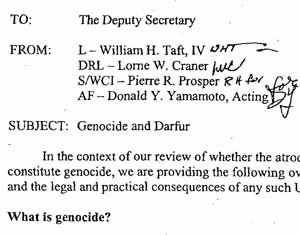Rwanda/Darfur: Documents reveal how Washington politically manipulates 'genocide' charges
Characterisation of Darfur violence as "genocide" had no "legal consequences" for US, according to 2004 State Department memo
August 17, 2011 – Article by National Security Archive fellow Rebecca Hamilton contrasts Darfur memo with 1994 finding that application of term to Rwanda would force US "to actually 'do something'"
For more information contact:
www.fightingfordarfur.com
hamilton [at] newamerica.net
* * *
A secret June 25, 2004, Department of State memo entitled “Genocide and Darfur” written by William Taft IV, the legal advisor to Secretary of State Colin Powell, stated that “a determination that genocide has occurred in Darfur would have no immediate legal – as opposed to moral, political or policy – consequences for the United States.”
Writing for The Atlantic, National Security Archive fellow Rebecca Hamilton argues that the memo’s determination that calling the conflict in Darfur genocide would yield no “legal consequences” influenced Secretary of State Colin Powell’s “judgment call” to become the first member of any US administration to apply the label genocide to an ongoing conflict.
The June 25, 2004 memo stands in stark contrast to a secret May 1994 State Department discussion paper on Rwanda – also declassified in response to a National Security Archive request – which warned that a finding of genocide in Rwanda might obligate the Clinton administration “to actually ‘do something’”. The briefing paper helps explain why, with clear evidence to the contrary, US officials refused to label the massacres of more than 800,000 Tutsi and moderate Hutu in Rwanda as genocide.
In her book, Fighting for Darfur, Hamilton interviewed Assistant Secretary of State Lorne Craner, who crafted the State Department’s investigation into whether genocide was occurring in Darfur. He recounted that the Department of State was heavily influenced by massacres in Rwanda a decade earlier. He remembers Powell instructing him, “There is not going to be another Rwanda.”
In addition to advising Powell that terming the events in Darfur genocide had no “legal consequences”, the 2004 memo also stated that “a finding of genocide can act as a spur to the international community to take more forceful and immediate actions to respond to ongoing atrocities”.
On September 9, 2004, free from the “legal implications” of the term and hoping to “spur” the international community into action, Secretary of State Colin Powell sat before Senate Foreign Relations Committee and testified that the Department of State had “concluded that genocide has been committed in Darfur and that the government of Sudan and the jinjaweid bear responsibility —and that genocide may still be occurring.”
Read Rebecca Hamilton's article at The Atlantic.